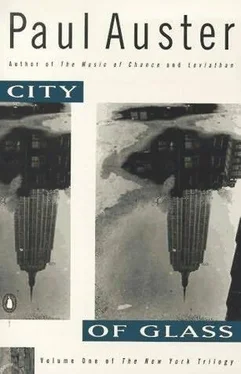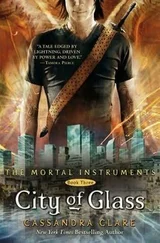Paul Auster - City of Glass
Здесь есть возможность читать онлайн «Paul Auster - City of Glass» весь текст электронной книги совершенно бесплатно (целиком полную версию без сокращений). В некоторых случаях можно слушать аудио, скачать через торрент в формате fb2 и присутствует краткое содержание. Жанр: Современная проза, на английском языке. Описание произведения, (предисловие) а так же отзывы посетителей доступны на портале библиотеки ЛибКат.
- Название:City of Glass
- Автор:
- Жанр:
- Год:неизвестен
- ISBN:нет данных
- Рейтинг книги:5 / 5. Голосов: 1
-
Избранное:Добавить в избранное
- Отзывы:
-
Ваша оценка:
- 100
- 1
- 2
- 3
- 4
- 5
City of Glass: краткое содержание, описание и аннотация
Предлагаем к чтению аннотацию, описание, краткое содержание или предисловие (зависит от того, что написал сам автор книги «City of Glass»). Если вы не нашли необходимую информацию о книге — напишите в комментариях, мы постараемся отыскать её.
City of Glass — читать онлайн бесплатно полную книгу (весь текст) целиком
Ниже представлен текст книги, разбитый по страницам. Система сохранения места последней прочитанной страницы, позволяет с удобством читать онлайн бесплатно книгу «City of Glass», без необходимости каждый раз заново искать на чём Вы остановились. Поставьте закладку, и сможете в любой момент перейти на страницу, на которой закончили чтение.
Интервал:
Закладка:
So ended Stillman's synopsis of Henry Dark's pamphlet, dated December 26, 1690, the, seventieth anniversary of the landing of the Mayflower.
Quinn let out a little sigh and closed the book. The reading room was empty. He leaned forward, put his head in his hands, and closed his eyes. "Nineteen sixty," he said aloud. He tried to conjure up an image of Henry Dark, but nothing came to him. In his mind he saw only fire, a blaze of burning books. Then, losing track of his thoughts and where they had been leading him, he suddenly remembered that 1960 was the year that Stillman had locked up his son.
He opened the red notebook and set it squarely on his lap. Just as he was about to write in it, however, he decided that he had had enough. He closed the red notebook, got up from his chair, and returned Stillman's book to the front desk. Lighting a cigarette at the bottom of the stairs, he left the library and walked out into the May afternoon.
7
HE made it to Grand Central well in advance. Stillman's train was not due to arrive until six-forty-one, but Quinn wanted time to study the geography of the place, to make sure that Stillman would not be able to slip away from him. As he emerged from the subway and entered the great hall, he saw by the clock that it was just past four. Already the station had begun to fill with the rush-hour crowd. Making his way through the press of oncoming bodies, Quinn made a tour of the numbered gates, looking for hidden staircases, unmarked exits, dark alcoves. He concluded that a man determined to disappear could do so without much trouble. He would have to hope that Stillman had not been warned that he would be there. If that were the case, and Stillman managed to elude him, it would mean that Virginia Stillman was responsible. There was no one else. It solaced him to know that he had an alternate plan if things went awry. If Stillman did not show up, Quinn would go straight to 69th Street and confront Virginia Stillman with what he knew.
As he wandered through the station, he reminded himself of who he was supposed to be. The effect of being Paul Auster, he had begun to learn, was not altogether unpleasant. Although he still had the same body, the same mind, the same thoughts, he felt as though he had somehow been taken out of himself, as if he no longer had to walk around with the burden of his own consciousness. By a simple trick of the intelligence, a deft little twist of naming, he felt incomparably lighter and freer. At the same time, he knew it was all an illusion. But there was a certain comfort in that. He had not really lost himself, he was merely pretending, and he could return to being Quinn whenever he wished The fact that there was now a purpose to his being Paul Auster-a purpose that was becoming more and more important to him-served as a kind of moral justification for the charade and absolved him of having to defend his lie. For imagining himself as Auster had become synonymous in his mind with doing good in the world.
He wandered through the station, then, as if inside the body of Paul Auster, waiting for Stillman to appear. He looked up at the vaulted ceiling of the great hall and studied the fresco of constellations. There were light bulbs representing the stars and line drawings of the celestial figures. Quinn had never been able to grasp the connection between the constellations and their names. As a boy he had spent many hours under the night sky trying to tally the clusters- of pinprick lights with the shapes of bears, bulls, archers, and water carriers. But nothing had ever come of it, and he had felt stupid, as though there were a blind spot in the center of his brain. He wondered if the young Auster had been any better at it than he was.
Across, the way, occupying the greater part of the station's east wall, was the Kodak display photograph, with its bright, unearthly colors. The scene that month showed a street in some New England fishing village, perhaps Nantucket… A beautiful spring light shone on the cobblestones, flowers of many colors stood in window boxes along the house fronts, and far down at the end of the street was the ocean, with its white waves and blue, blue water. Quinn remembered visiting Nantucket with his wife long ago, in her first month of pregnancy, when his son was no more than a tiny almond in her belly. He found it painful to think of that now, and he tried to suppress the pictures that were forming in his head. "Look at it through Auster's eyes," he said to himself, "and don't think of anything else." He turned his attention to the photograph again and was relieved to find his thoughts wandering to the subject of whales, to the expeditions that had set out from Nantucket in the last century, to Melville and the opening pages of Moby Dick. From there his mind drifted off to the accounts he had read of Melville's last years-the taciturn old man working in the New York customs house, with no readers, forgotten by everyone. Then, suddenly, with great clarity and precision, he saw Bartleby's window and the blank brick wall before him.
Someone tapped him on the arm, and as Quinn wheeled to meet the assault, he saw a short, silent man holding out a green and red ballpoint pen to him. Stapled to the pen was a little white paper flag, one side of which read: "This good article is the Courtesy of a DEAF MUTE. Pay any price. Thank you for your help." On the other side of the flag there war, a chart of the manual alphabet-LEARN TO SPEAK TO YOUR FRIENDS-that showed the hand positions for each of the twenty-six letters. Quinn reached into his pocket and gave the man a dollar. The deaf mute nodded once very briefly and then moved on, leaving Quinn with the pen in his hand.
It was now past five o’clock. Quinn decided he would be less vulnerable in another spot and removed himself to the waiting room. This was generally a grim place, filled with dust and people with nowhere to go, but now, with the rush hour at full force, it had been taken over by men and women with briefcases, books, and newspapers. Quinn had trouble finding a seat. After searching for two or three minutes he finally found a place on one of the benches, wedging himself between a man in a blue suit and a plump young woman. The man was reading the sports section of the Times, and Quinn glanced over to read the account of the Mets' loss the night before. He had made it to the third or fourth paragraph when the man turned slowly toward him, gave him a vicious stare, and jerked the paper out of view.
After that, a strange thing happened. Quinn turned his attention to the young woman on his right, to see if there was any reading material in that direction. Quinn guessed her age at around twenty. There were several pimples on her left cheek, obscured by a pinkish smear of pancake makeup, and a wad (if chewing gum was crackling in her mouth. She was, however, reading a book, a paperback with a lurid cover, and Quinn leaned ever so slightly to his right to catch a glimpse of the title. Against all his expectations, it was a book he himself had written -Suicide Squeeze by William Wilson, the first of the Max Work novels. Quinn had often imagined this situation: the sudden, unexpected pleasure of encountering one of his readers. He had even imagined the conversation that would follow: he, suavely diffident as the stranger praised the book, and then, with great reluctance and modesty, agreeing to autograph the title page, "since you insist." But now that the scene was taking place, he felt quite disappointed, even angry. He did not like the girl sitting next to him, and it offended him that she should be casually skimming the pages that had cost him so much effort. His impulse was to tear the book out of her hands and run across the station with it.
He looked at her face again, trying to hear the words she was sounding out in her head, watching her eyes as they darted back and forth across the page. He must have been looking too hard, for a moment later she turned to him with an irritated expression on her face and said "You a got problem mister?"
Читать дальшеИнтервал:
Закладка:
Похожие книги на «City of Glass»
Представляем Вашему вниманию похожие книги на «City of Glass» списком для выбора. Мы отобрали схожую по названию и смыслу литературу в надежде предоставить читателям больше вариантов отыскать новые, интересные, ещё непрочитанные произведения.
Обсуждение, отзывы о книге «City of Glass» и просто собственные мнения читателей. Оставьте ваши комментарии, напишите, что Вы думаете о произведении, его смысле или главных героях. Укажите что конкретно понравилось, а что нет, и почему Вы так считаете.












